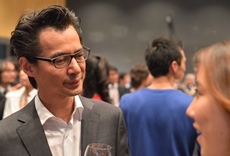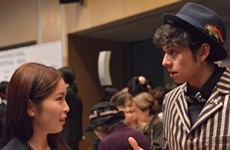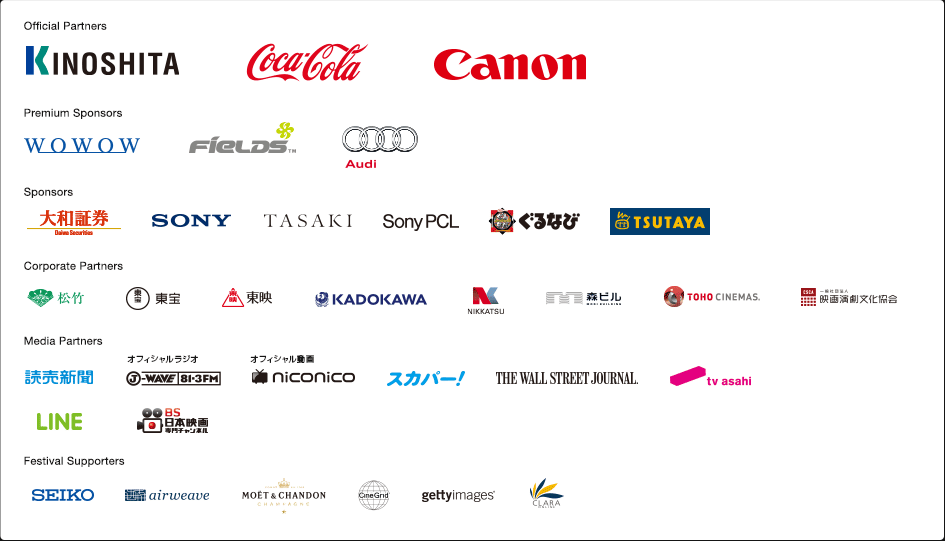The Closing Night interview was held with the juries and the guests who participated in the 27th Tokyo International Film Festival!
Photography by Tokyo International Film Festival Student PR Team and 27th TIFF Volunteers
<International Competition Jury>
James Gunn (President of Jury)

Q: How do you feel about coming to Japan and joining this film festival?
I feel very excited. I’m excited to be here in Tokyo for the first time. I had a great time with my fellow jury members. It was a lot of fun.
Q: Was it hard for you to decide the award winner?
No. Not for me. I knew what I wanted it to be so it was pretty easy. I’m a film director therefore I make quick decisions and I understood what I thought should win.
Q: Did you go to the Ghibli Museum?
No I did not. We only went to the Robot Restaurant and the Owl Café with the owls. It was fun.
John H. Lee

Q: How do you feel about coming to Japan and joining this film festival?
I am tremendously honored to be here in this festival. I really enjoyed it. I have been in Japan for many times. You will probably know me as the director of “Watashi-no atama-no naka-no keshigomu” (A Moment to Remember) and “Sayonara Itsuka” (Saying good-bye, oneday) and also “Senka-no Nakae” (Into the Fire). All of these films opened in the theaters in Japan. So I have visited for the openings of these films and that is why I am very well acquainted with Tokyo. I love this city and I was very happy to come back.
Q: Was deciding which film to give the awards to a difficult thing?
Yes. It was really difficult for me. I mean it was not only my decision. It was the jury decision. So it was very difficult for us to decide the Grand Prix. Yet it was so easy to decide the Best Actress. Everybody in the jury voted for Rie Miyazawa.
Debbie Mcwilliams

Q: How do you feel about coming to Tokyo International Film Festival as a jury?
My reply now will be very different from the reply that I gave on the day one. I came full of expectations but it is slightly worn down now. The big problem for me was that all the films were about the issues. I would have just loved them if it had been more with stories. It was all about drought, famine and poverty. It was all kind of hypothetical. It has its place, but equally and especially for the film festivals, I think that there’s a great opportunity to just tell a story. I would encourage the young film makers to consider that as much as taking up an issue. Also, there were lots of films that didn’t have a proper real actors. There were lots of real people and that got a bit tiresome after a while. Soon as we saw the real actor, we all said “Oh, thank goodness”. Because it really showed what an artful thing the acting is. You just can’t take people off the street and expect them to show the depth of emotions. It is really difficult. It’s like grabbing a people off the street and giving them a violin. Why would they be able to play it? Acting is a very serious art form. Many actors make it look so easy that everybody thinks that they can do it. But believe me, they cannot.
Q: Was it difficult for you to choose a single film?
Yes. There were certain things that we did unanimously agree on but not on everything. So we had a bit of give and take and bit of negotiations like, “if I give you this will you give me that”. So in the end, we felt that every film that deserved an award got one. It may not have been quite a right one but at least they got something. Everybody who deserved something got one. So we felt the best men won.
Q: Are you satisfied with the result?
I shouldn’t speak out too loudly but I gave away on one thing but I won another. That was what the negotiation was all about and that was what the jury was all about. As long as enough people agree, then that is what really counts. I was so upset. I wanted to see the different name for the award. The best picture won two awards but so did “TEST” and that was my favorite film.
<Festival Navigator>
Harry Sugiyama

Q: How do you feel about coming to the Tokyo International Film Festival?
I am absolutely delighted, over the moon. Not just to come here but obviously to be able to be a film festival navigator. It’s been one of my ambitions in life to be able to talk about my passion towards the films. I was also able to talk about so many amazing creators and directors. Just today, “Heaven Knows What” scored the Tokyo Grand Prix. Every single day, I’ve been seeing a film whether it being at Roppongi or being at Nihonbashi, I was always here. It’s quite funny because every single day when I went to see the film I sometimes took a friend of mine, an actress girl or someone. And all you students and volunteers were talking about who I went out with each day. Oh, well I’m just joking. I am sorry. I am just trying get people to feel it underneath their skin.
Q: How was it like being the MC for The 4th Japan Student Film Festival?
That was something completely different. It is part of Tokyo International Film Festival. I am coming to grips with people who possibly hold the future of the Japanese Cinema. It was a fantastic experience. The films that I actually saw did have a real good bite. It had a good sting to them. Especially the film about the boxer which I saw, “Fuzakerunja-ne-yo” (KIM). Another film that I saw that was good to see was “Botti”. There were so many crazy ideas and I was really glad that that kind of material was really appearing in the forefront. I hate to see the people walk away from the cinema. Watching the film is about feeling it with your six senses and I love to do it. I use to love going to the cinema with my Dad. What’s good about the cinema is that you can see it and you can feel it; not just between you and your Dad or your family or our wife or your loved ones. We see it with whole bunch of other people at the same time. That is why the emotions of the delight, anger, sorrow and pleasure sinks into our hearts.
Part II (Festival Guests)
























